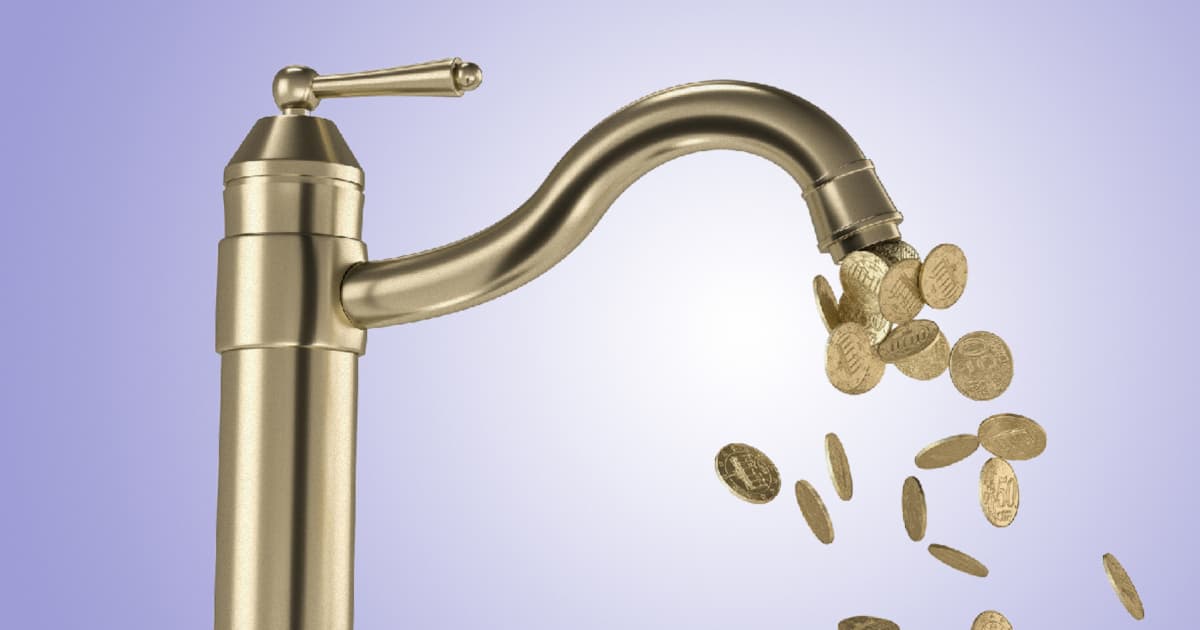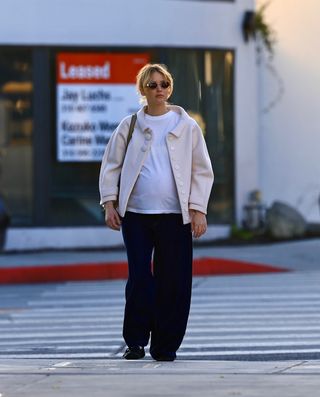In a world fixated on cryptocurrency and AI, buying dividend stocks—those of companies who have made years, if not decades, of steady payouts—may seem old fashioned. But it is also extremely effective.
In fact since 1930, 40% of all stock market returns have been from dividends, according to Fidelity Investments, hardly something to scoff at. In flat or down markets in particular, an income stream becomes very valuable indeed.
Dividends aren’t hard to find: Roughly 4 in 5 stocks in the S&P 500 pay a dividend, typically once a quarter. But some sectors are more generous than others: Real estate and energy companies tend to boast the largest yields, currently close to 4% on average. While fast-growing tech companies offer the stingiest, averaging less than 1%. (Yield compares the value of a company’s annual dividend to its share price.) Dividends are also flexible: Investors can either take the dividends in cash or reinvest them. But remember even reinvested dividends are still taxable.
Of course, as with any investment strategy, there are some dividend pitfalls to avoid. One of the biggest is a so-called value trap. These stocks offer seemingly generous payouts relative to their share prices—but only because their share prices have recently been beaten down by frustrated investors. Many of these companies, which are in poor financial health, end up cutting their dividends, leaving buyers high and dry.
To help navigate this tricky but rewarding market niche, we talked to five top fund managers and analysts from investment firms such as Neuberger Berman, T. Rowe Price, Eaton Vance and more. We narrowed down the dividend investing universe to a few of their favorite names, those companies which combine compelling growth prospects with attractive price-to-earnings ratios and healthy yields.
Here are their favorite picks.
Darden Restaurants
- Ticker: DRI
- Yield: 3.19%
- Share price: $149
- Forward price-to-earnings ratio: 17
- Who picked it: Sandy Pomeroy, portfolio manager of Neuberger Berman Equity Income Fund (NBHIX)
If you are a regular customer of popular restaurant chain Olive Garden and its unlimited soup, salad and breadsticks, you are of keen interest to Neuberger Berman’s Sandy Pomeroy.
That’s because Pomeroy is a fan of parent company Darden Restaurants, which oversees not just Olive Garden but other chains like LongHorn Steakhouse and Capital Grille.
Pomeroy’s sweet spot is companies that not only boast a dividend yield of at least 3% but also enjoy growth prospects that could allow them to boost their dividends even further. “In situations where the market goes nowhere, the returns investors get are basically only dividends,” says Pomeroy. “And what we know is that our companies are very likely to pay dividends.”
Darden enjoyed a very solid 2022, as investors shied away from more speculative stocks in favor of reliable cash machines. But Pomeroy thinks there is even more runway ahead: In fact, the company just announced the acquisition of another prominent name in the restaurant world, Ruth’s Chris Steak House.
To be sure, there are plenty of challenges to overcome, in a business where many restaurants just aren’t able to make the numbers work. From food cost inflation, to rising wages, to a Covid crisis that temporarily shut down the whole dine-in industry, restaurant operators have had to rewrite their business playbooks on the fly.
Darden used that Covid period to re-evaluate essentially everything in their business model, Pomeroy says: From the use of technology to marketing to cost controls, which lets them keep menu price increases below inflation rates. They also eschewed the trend of third-party delivery apps, referring to control all points of the customer experience.
That’s why sticking to established operators, with proven track records and solid dining brands, is key. “There are a lot of minefields in the consumer discretionary sector, and we feel this is a strong class act in an area that can be vulnerable to fickle customers,” she says. “We think they are very well-positioned, with a strong understanding of their customer. They are best-in-class.”
Becton Dickinson
- Ticker: BDX
- Yield: 1.38%
- Share price: $253
- Forward price-to-earnings ratio: 22
- Who picked it:Tom Huber, Portfolio Manager, T. Rowe Price Dividend Growth Fund (PRDGX)
This medical equipment and supply firm is very familiar to income investors, thanks to its hallowed status as a so-called dividend aristocrat: Those companies which have increased their dividends annually for at least the past 25 years.
Its absolute yield may not be lofty—in fact it is slightly below the average yield of the S&P 500, which currently stands at 1.65%—but that record of uninterrupted dividend growth means that investors can be confident of enjoying an annual raise.
Since Becton Dickinson’s stock price has basically been level for the past five years, that has made it a “frustrating” investment for shareholders, admits Huber. But its steady, recurring business of medical supplies—not sexy, perhaps, but certainly needed—means that it is an especially attractive investment in volatile market times.
Its defensive nature, coupled with reliable income, should give recession-wary investors some comfort as a place to hide out while still enjoying growth potential.
Its mix of new product launches, aggressive R&D investing, targeted acquisitions, and smart cost management makes for a solid balance sheet and accelerating growth prospects. “We’re starting to see some traction there,” Huber says. “This is a company where we can look for low double-digit earnings growth. That’s a nice thing, in a world where we are not quite sure where things are going.”
In fact with the stock currently around $255, Huber thinks it should be more properly valued around $305 to $310, which would be a very healthy boost for new investors.
“I like the defensive nature, I like the growth in the yield, I like the visibility going forward,” says Huber. “They’re doing all the right things.”
Stanley Black & Decker
- Ticker: SWK
- Yield: 3.7%
- Share price: $79
- Forward price-to-earnings ratio: 17
- Who picked it: Grace Lee, Portfolio Manager, Columbia Dividend Opportunity Fund (INUTX)
This is another dividend aristocrat that likely has a place in your home already, in the form of your household toolbox. In addition to being your go-to DIY resource, Stanley Black & Decker has boosted its dividend for a whopping 55 years in a row.
That explains the stock’s appeal for Columbia Threadneedle portfolio manager Grace Lee, who is always looking for “solid dividend payers at attractive valuations.” Stanley Black & Decker fits the bill, since starting at the end of 2022, “a lot of dividend payers were unduly punished as people started getting back into growth stocks. There’s a lot of opportunity out there right now.”
In fact Stanley Black & Decker is down roughly 30% in the past year, a compressed valuation which has led to a juicy yield of 3.7%. Much of that stems from inventory issues, Lee says: There is a lot of product on the shelves that retailers are trying to work through.
As that backlog moves, profit margins should start ticking north again, and production will ramp back up, bringing earnings-per-share closer to historical averages. Right now metrics like price-to-sales and price-to-book are lower than you typically see for this classic name, which could mean a smart buying moment for investors with dry powder.
Lee isn’t alone in seeing upside surprises here, with a number of recent analyst upgrades to “buy” and “strong buy.” “People are starting to recognize value here, because this is a solid company and their issues are temporary,” she says. “It’s also doing a lot of self-help, in getting leaner and improving its supply chain. There’s a lot of potential in this name.”
Janus Henderson Group
- Ticker: JHG
- Yield: 6.05%
- Share price: $26
- Forward price-to-earnings ratio: 13
- Who picked it: Danan Kirby, client Portfolio Manager & Analyst, Ariel Fund (ARGFX)
Make no mistake, recent years have not been friendly to traditional asset managers. Investor adoption of ETFs and other low-cost index funds has put downward pressure on fund fees. That is great news if you’re an investor, but perhaps not so ideal for money managers.
One result is that Janus Henderson, which oversees $310 billion in assets under management, has been sluggish the past five years. Indeed, ever since the company was created by the 2017 merger of Janus Capital Group and Henderson Group, an event which kicked off multiple years of asset outflows. But take a fresh look at 2023: A new chief executive, a stock on sale, and asset inflows suggest that things may have turned a corner.
“It trades pretty cheaply to its intrinsic value”—that is, their measure of what the asset is worth, and what a rational investor should be willing to pay for it—“at around a 30% discount,” says Kirby. “As value managers, Janus ticks a lot of boxes for us.”
Those boxes include decent returns on capital, a significant economic moat that makes it difficult for competitors to breach its businesses and a management team that seems to be righting the ship. Kirby highlights a multi-pronged approach to revitalizing the franchise that includes better branding, amplifying its strengths such as institutional appeal, and diversification into areas such as the growth of its strong-performing Alternatives business.
The yield is notably high, currently around 6%—indeed so high, that some investors might wonder whether that dividend is sustainable. But they have “a lot of cash on their balance sheet, and have reaffirmed their plans to maintain that dividend,” says Kirby.
With new CEO Ali Dibadj on board (a former CFO of AllianceBernstein) and famed billionaire investor Nelson Peltz and his firm Trian as one of its principal shareholders, Kirby says he is “encouraged” that the storied name is back on the right track.
With the stock currently trading around $26, Kirby thinks it is more properly valued at $37—but it won’t happen overnight. “When buying firms that are mispriced, it requires some patience to turn things around,” he says. “Rome wasn’t built in a day.”
Automatic Data Processing
- Ticker: ADP
- Yield: 2.32%
- Share price: $213
- Forward price-to-earnings ratio: 25
- Who picked it: Charlie Gaffney, Portfolio Manager, Eaton Vance Dividend Builder Fund (EVTMX)
If you are looking for a company with a wide economic moat, a lion’s share of its market, and a decent dividend to boot, it’s unusual to also get a bargain price.
That happy combination takes patience from investors, says Morgan Stanley’s Charlie Gaffney, who oversees this income-oriented fund from Eaton Vance. But right now happens to be one of those times, when it comes to payroll giant Automatic Data Processing.
“I like the fact that you can buy a high-quality company on sale, trading at a discount to its historical averages,” Gaffney says. “To me that’s a good sign, and a unique opportunity you get in the markets once in a while. It’s a well-run, well-managed, powerful brand.”
But a fat dividend isn’t enough for Gaffney: He is looking for growth prospects as well, along with the pricing power that comes from being the market leader.
Given that revenue and earnings have been increasing rapidly, combined with robust profit margins and return-on-equity, it is curious that the stock has essentially been flat over the past 12 months. Perhaps it has been a victim to broader economic concerns, with recession fears having loomed for months—but a resilient job market has so far been defying those negative expectations.
Beyond just absolute yield, there are a number of factors that also matter to Gaffney—the free cash flow to cover that dividend, the history of maintaining it, and the potential to grow it. ADP fits the bill. “They have been increasing their dividend every year for a very long period of time,” he says. “Right now this stock is a good, safe place to be.”
How we picked:
To find the best dividend stocks we polled experienced fund managers at major mutual fund companies. We asked representatives of each portfolio to recommend one stock they felt had a solid dividend yield, an attractive valuation, and potential for growth.
We favored companies with strong brands and economic moats, and the size to weather coming storms, all with market caps in the billions of dollars. In general, we looked for companies whose stock price is likely to appreciate, and which are extremely likely to continue raising their dividends in future.
Forward price-to-earnings ratios represent estimated earnings over the next 12 months. All share prices are as of May 12, 2023.
Got a money question? Let Buy Side find the answer. Email money@buysidewsj.com.
Include your full name and location, and we may publish your response.
The advice, recommendations or rankings expressed in this article are those of the Buy Side from WSJ editorial team, and have not been reviewed or endorsed by our commercial partners.









![Brilliant Minds Season 1 Finale Review: [Spoiler’s] Return Throws Oliver’s World Out of Control Brilliant Minds Season 1 Finale Review: [Spoiler’s] Return Throws Oliver’s World Out of Control](https://cdn.tvfanatic.com/uploads/2025/01/Rushing-to-Save-the-Apartment-Victims-Brilliant-Minds-Season-1-Episode-12.jpg)


















